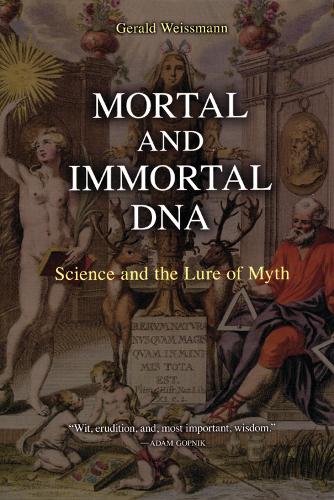
Mortal and Immortal DNA: Science and the Lure of Myth
(Paperback)
Publishing Details
Mortal and Immortal DNA: Science and the Lure of Myth
By (Author) Gerald Weissmann
Bellevue Literary Press
Bellevue Literary Press
2nd June 2009
United States
Classifications
General
Non Fiction
Genetics (non-medical)
570
Physical Properties
Paperback
192
Width 152mm, Height 231mm, Spine 15mm
269g
Description
Once again, Gerald Weissmann, with a firm and easy knowledge of everyone who matters from Auden to Zola, bridges the space between science and the humanities, and particularly between medicine and the muses, with wit, erudition, and, most important, wisdom. Adam Gopnik, author of Angels and Ages
Admired by Nobel prizewinning scientists and literary tastemakers alike, Weissmann will continue to amaze and beguile new and faithful readers as both a masterful commentator on contemporary culture and a transcendent intellectual historian. By turns satirical and insightful, Mortal and Immortal DNA takes us on a nuanced exploration of the western canon, from Greek mythology through Dante to W.H. Auden and offers hilarious insights into popular culture along the way, from Paris Hilton to the true life story of Kathryn Lee Bates, the lesbian poet who penned America the Beautiful.
Gerald Weissmann is a physician, scientist, editor, and essayist whose collections include Epigenetics in the Age of Twitter: Pop Culture and Modern Science; Mortal and Immortal DNA: Science and the Lure of Myth; and Galileos Gout: Science in an Age of Endarkenment. He is professor emeritus and research professor of medicine at New York University School of Medicine. His essays and reviews have appeared in numerous publications worldwide, including the London Review of Books and New York Times Book Review. The former editor-in-chief of the FASEB Journal, he is now its book reviews editor. He lives in Manhattan and Woods Hole, Massachusetts.
Reviews
Select Praise for Gerald Weissmann
Gerald Weissmann is Lewis Thomas's heir. --Robert Coles
Weissmann has a strong and well-informed interest, unusual for a scientist, both in poetry and in art. --Freeman Dyson
[Weissmann] bridges the space between science and the humanities, and particularly between medicine and the muses, with wit, erudition, and, most important, wisdom. --Adam Gopnik
America's most interesting and important essayist. --Eric Kandel
How I envy the reader coming upon Dr. Weissmann's elegant, entertaining essays for the first time! --Jonas Salk
Dr. Weissmann's juggling with the balls of global politics, biology, medicine, and culture in the framework of history is breathtaking. --Bengt Samuelsson, Nobel Laureate and former chairman of the Nobel Foundation
The premier essayist of our time, Weissmann writes with grace and style. --Richard Selzer
An absolutely first-rate writer. --Kurt Vonnegut
[Weissmann] is a man of wide culture, a captivating and graceful writer. --New Yorker
Weissmann introduces us to a new way of thinking about the connections between art and medicine. --New York Times Book Review
Oliver Sacks, Richard Selzer, Lewis Thomas . . . Weissmann is in this noble tradition.--Los Angeles Times
As a belles-letterist, Weissmann is the inheritor of the late Lewis Thomas . . . Like Thomas, he's a gifted researcher and clinician who writes beautifully. Unlike Thomas, he is an original and indefatigable social historian as well. --Boston Globe
He writes as a doctor, a medical scientist, a knowing lover of art and literature and a modern liberal skeptic. But more than anything else, Weissmann writes as a passionate and wise reader. --New Republic
Weissmann is a master of the essay form. His witty and elegant prose makes the toughest subject matter not only accessible but entertaining. --Barnes and Noble Review
[Weissmann] is a Renaissance Man. . . . He'll stretch your mind's hamstrings. --Christian Science Monitor
[Weissmann's essays] intertwine the profound connections of science and art in the context of our modern era . . . to illuminate the ongoing challenges scientists face in dealing with scrutiny and criticism, from colleagues and from our broader society. --Science
Weissmann not only endeavors to connect the realms of literature and medicine, but also to create community among readers in light of class, race, religion, and age. --Glassworks Magazine
Essays that brim with knowledge and bubble with attitude. --Kirkus Reviews
Erudite, engaging, and accessible. --Library Journal
Juicy and conversational. --Booklist
Weissmann models his work after that of his mentor, Lewis Thomas. . . . His ideas . . . are every bit as important. --Publishers Weekly
Weissmann's humanist, sometimes sardonic, voice binds together disparate strands to show how all human endeavor is linked. . . . Weissmann clearly sees how history obfuscates the work of women, people of color and immigrants, and tries to alter that. --Shelf Awareness for Readers
Author Bio
Gerald Weissmann is a physician, scientist, editor, and essayist whose collections include Epigenetics in the Age of Twitter: Pop Culture and Modern Science; Mortal and Immortal DNA: Science and the Lure of Myth; and Galileo's Gout: Science in an Age of Endarkenment. He is professor emeritus and research professor of medicine at New York University School of Medicine. His essays and reviews have appeared in numerous publications worldwide, including the London Review of Books and New York Times Book Review. The former editor-in-chief of the FASEB Journal, he is now its book reviews editor. He lives in Manhattan and Woods Hole, Massachusetts.
